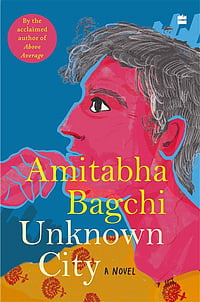Pushpa Palat refers to this as a historical novel on Instagram, and the pages are filled with dramatized descriptions. Certainly, Marthanda Varma, who came to the throne of Travancore at the age of 23, spent his early life evading nobles who believed they had a stronger claim to the throne than he did—leading to many episodes that could well have come straight out of fiction. According to the authors, he once even leapt into a ravine and escaped with his life, finding shelter in a tunnel that ran below. And that doesn’t even take into account the description of Marthanda Varma sitting on a swing in his palace, fighting off an assassin with a kick as he swung back and forth.
History illuminated by passages of fiction is very much a genre these days. The opening is the most dramatic – a fugitive running from his pursuers, finding shelter in a Shiva temple, and being rescued by a priest who recognises him and helps him escape, sacrificing his own life in the process.
That he escaped, we know – history records his role in shaping Travancore. Marthanda Varma remains the only Indian ruler to defeat a foreign power, namely the Dutch, at sea. He was also the ruler who consolidated Travancore’s power and extended its reach – much to the annoyance of the Dutch, who joined forces with several disgruntled local rulers to oppose him. This culminated in the Battle of Colachel, which crushed Dutch ambitions over the pepper trade. Marthanda Varma, however, was pragmatic – he had no qualms about seeking help from the French or British when needed, and even employed foreign mercenaries to train his forces. He mastered the use of infantry and built coastal batteries in remarkably short order.
As a first step in consolidating his power, the king appointed capable individuals to key positions of authority. Chief among them was a gifted young Brahmin, Ramayyan, whom the king personally selected as Secretary to the State. This close and enduring partnership would go on to form the bedrock of the kingdom’s future. Ramayyan stood by him through numerous conspiracies—some of them staged under the most dramatic of circumstances—and defeated many with the help of spies. After Colachel, he also enlisted a Frenchman, De Lannoy, as commander of his troops. His gift for finding the right people added strength to his arm and helped him ride the waves of change.
Following the Dutch defeat after a long and fierce struggle, the king faced a depleted treasury, as was often the case. But fortune favoured him – a miraculous discovery of gemstone-rich mines within his kingdom helped replenish the coffers, enabling him to press ahead with his plans for the welfare and growth of his small kingdom.
The book chronicles many of Marthanda Varma’s reforms, including the standardisation of pepper, salt and tobacco prices so that trade would be fairer—regardless of whether the traders were Dutch or from other parts of India. The king took a hands-on approach to revitalising the region’s agricultural infrastructure, especially in the most fertile zones. A new anicut was built to irrigate several miles of farmland and to supply fresh drinking water to the capital, Padmanabhapuram. Canals and tanks were freshly excavated, extending water access to regions that had long gone without. Land that once yielded a single harvest now produced two crops a year, significantly increasing state revenue. Roads, market squares and thoroughfares were developed, opening new avenues for trade and commerce.
Conquests, however, were not easy. The Rajah of Quilon, in a dramatic turn, secretly dumped his vast wealth into a bottomless lake and fled, leaving behind an empty palace and a state ready for annexation.
There is also an account of Marthanda Varma performing the lavish Hiranyagarbha ceremony, in which he donated a cow made of solid gold to the temple so that he might be reborn as a Kshatriya—a ritual earlier performed by the Zamorin of Calicut. Though he had to request a contribution from the Dutch (who gave very little), Marthanda Varma still carried out the ceremony with grandeur, earning the honour and recognition of the many Rajahs who were now part of his empire.
Well-researched, the book recounts Marthanda Varma’s career in lucid detail, covering both treaties and treachery. The authors do not flinch from describing the brutal realities of the time—not that ours is any less brutal today, perhaps only more sophisticated in its execution.
(Anjana Basu is an advertising consultant and writer based in Kolkata. She has authored several novels and children's books, including In the Shadow of the Leaves, Lockdown Tiger, and Chinku and the Wolfboy. In 2004, she received the Hawthornden Fellowship in Scotland to work on her novel Black Tongue.)




























